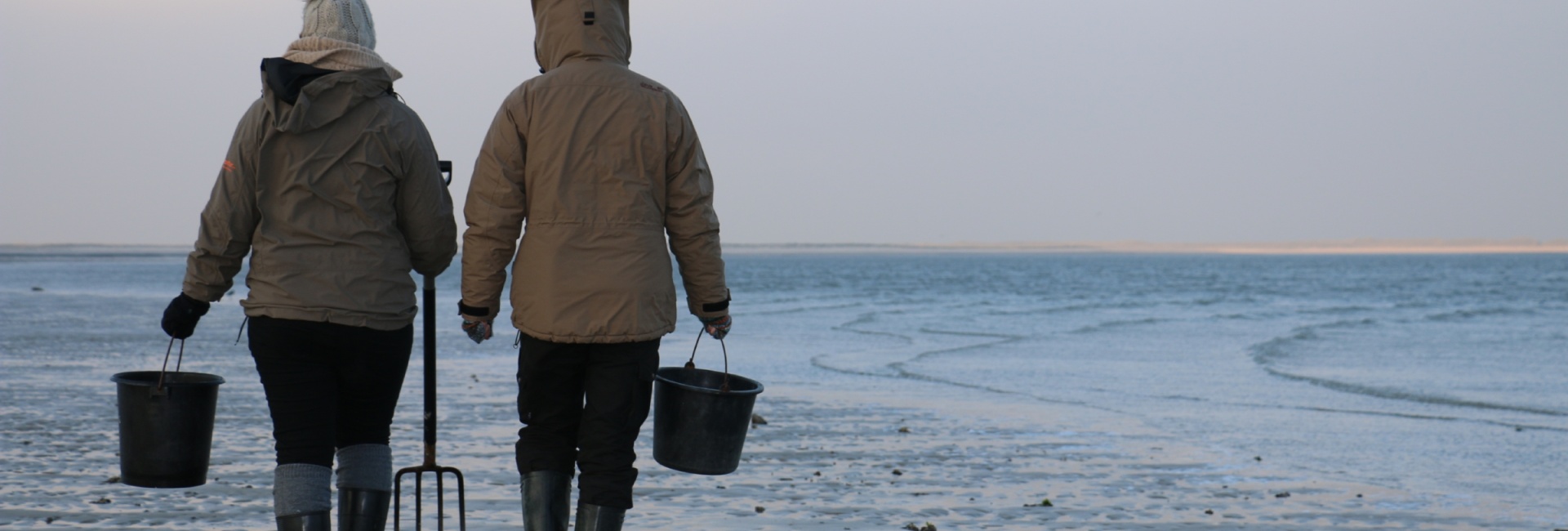The importance of mud
How does the North Sea bind, cycle and store carbon dioxide (CO2) in form of particulate organic matter on the seafloor, and how are human activities and climate change affecting this ecosystem service. These are the key questions, researchers want to address in the BMBF-funded project APOC in the coming three years.
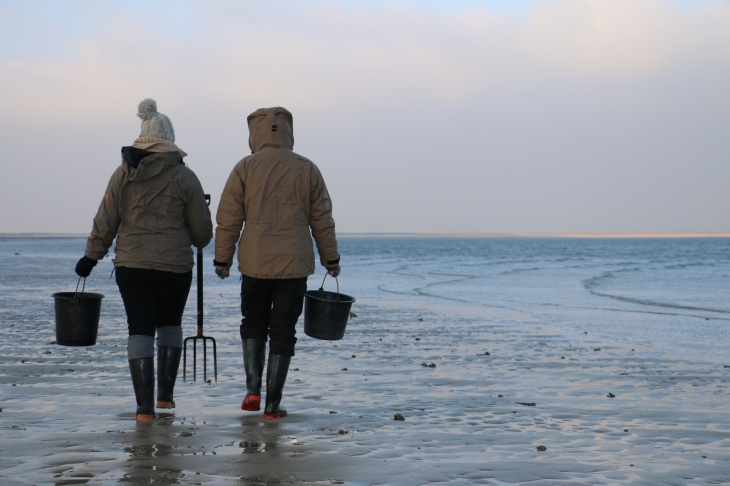
Forschende auf dem Weg durchs Watt vor List, Sylt. Foto: Melanie Steur-Fiener
The muddy seafloor is a rather unspectacular coastal environment, but its high content of particulate organic carbon (POC) makes it an important sink of carbon/CO2and thus one of our greatest allies in the climate crisis. In the project “Anthropogenic impacts on particulate organic carbon cycling in the North Sea” (APOC), researchers use sediment core analyses, resuspension experiments and numerical simulations to investigate how muddy sediments and POC are transported, cycled and ultimately deposited at the bottom of the North Sea. “A key question in this respect is how this ecosystem service will change in the future as a consequence of predicted accelerating environmental change and sea-level rise as well as human activities – including bottom-trawling fisheries, resource extraction/sediment management and offshore wind farm construction,” says Prof Dr Sabine Kasten, sediment geochemist at the Alfred Wegener Institute in Bremerhaven.
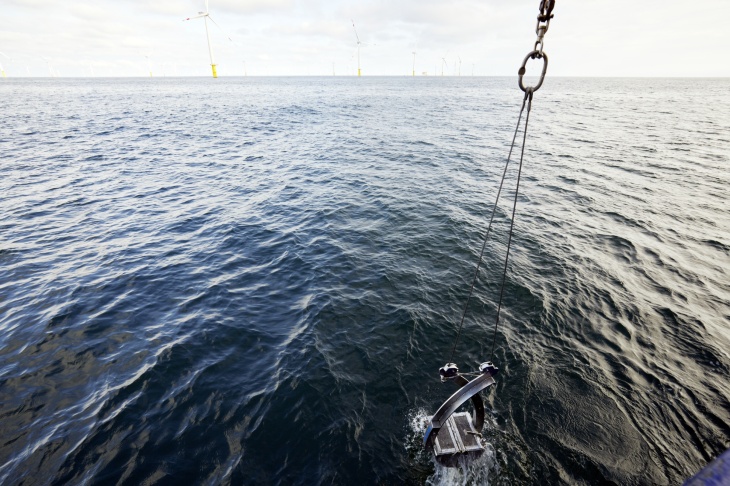
A box corer samples sediments and living creatures on the seabed. Photo: Heiner Mueller-Elsner
The 3-year collaborative project started in April this year and is funded with 2.65 million Euros by the German Federal Ministry of Education and Research (BMBF) in the framework of the MARE:N program “Oceans under Stress”. It integrates the expertise of four institutions and one NGO – namely the Alfred Wegener Institute Helmholtz Centre for Polar and Marine Research AWI, the Helmholtz Centre Hereon, the GEOMAR Helmholtz Centre for Ocean Research Kiel, the University of Hamburg and the BUND. The project is coordinated by Prof Dr Sabine Kasten (AWI) and Dr Wenyan Zhang (Hereon).
Key topics
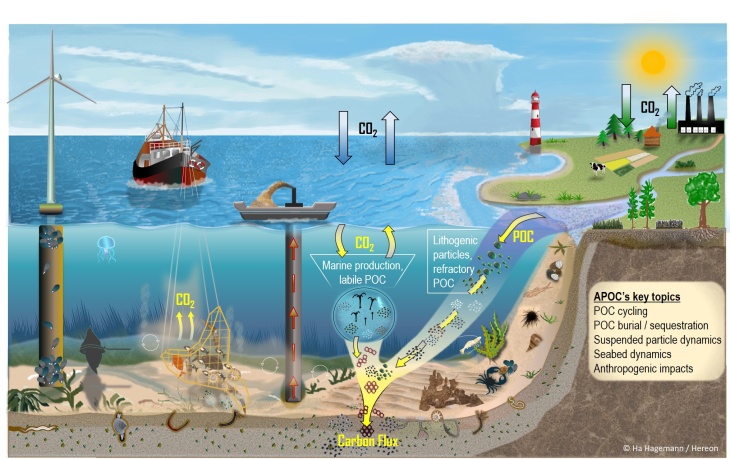
Key topics of the BMBF funded research project APOC: Anthropogenic impacts on particulate organic carbon cycling in the North Sea Graphic: Hereon/Ha Hagemann
AWI focusses on the investigation of mud transport, resuspension and deposition as well as particulate organic carbon mineralization going along with CO2 release in the so-called Helgoland Mud Area, which represents the largest depocenter of muddy sediments in the Southern North Sea. One of the key objectives is to assess how carbon storage has changed over the last century as a consequence of environmental/climate change and human activities.
GEOMAR investigates the Skagerrak, the overall largest depo center of the North Sea. Most of the organic matter that is not degraded by microbes is ultimately transported to the Skagerrak where it is buried in muddy sediments. GEOMAR reconstructs the change in organic matter and sediment burial in this area over the past 100 years. The resulting time series will be used to understand how human activities have affected the turnover of organic matter and sediments in the North Sea.
Hereon develops and applies an integrated 3-Dimensional modeling system called GCOAST, which is open source, to (1) quantify the physical and biogeochemical processes that control the mineralization and deposition of POC in sediment, and to (2) figure out how these processes have changed and are changing over the past 100 years as well as their possible change in the forthcoming decades. The modeling work is combined with field investigations to answer the question to what extent human activities (bottom trawling fisheries, resource extraction/sediment management and river damming) together with climate change have altered and will likely alter the storage capacity of POC in sediments.
The University of Hamburg quantifies living and non-living organic carbon pools and creates scenarios for the possible future distribution of carbon in these pools in the North Sea.
BUND translates scientific results into sound recommendations for political action towards a sustainable resource management of the North Sea at national, regional and EU level and transfers the knowledge to the public.
Recommendations for political decision-makers
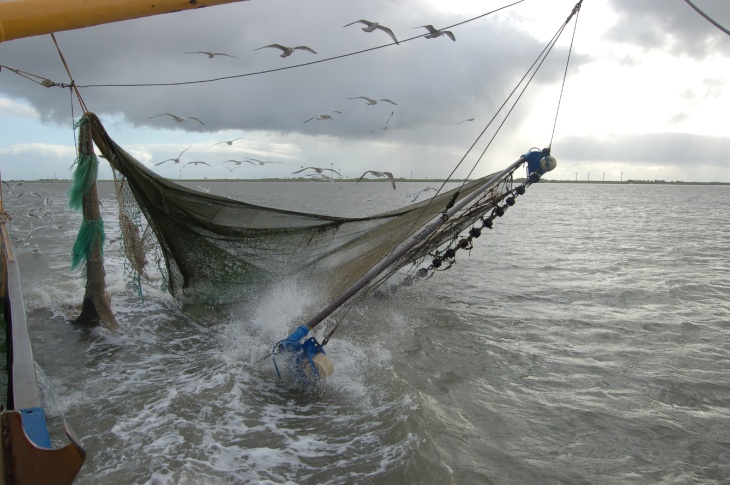
A shrimp fishing vessel operating in the North Sea. Photo: Sina Loeschke
The results will be used for a coordinated dialogue with stakeholders and to formulate recommendations for political decision-makers. Knowledge transfer is central to the researchers' work. "It is important to inform about the consequences of human actions," says Wenyan Zhang. These, in turn, are then translated to regional, national and EU bodies. Lastly, the research results will be placed in the context of current marine policy, combined with suggested options for action to the relevant bodies, as well as extensive preparation for the public.
Contact
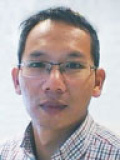
Phone: +49 (0)4152 87-1568
E-mail contactWebsite
Institute of Coastal Systems - Analysis and Modeling
Helmholtz-Zentrum Hereon
